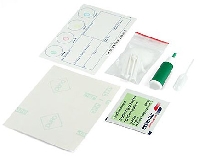
Home medical tests are convenient, safe and effective
The debate over the Affordable Care Act or Obamacare has everyone looking at the cost of health care and medical insurance more closely these days. Even if you have excellent health insurance, it can be difficult to schedule time for a doctor visit.
We sometimes wonder if there’s a test we can perform at home that can analyze the symptoms and either help the doctor quickly diagnose our ailment or even allow us to perform our own treatment without a visit. With hospital stays getting shorter, many doctors are requiring patients to do their own health monitoring at home. Some of these tests require sending blood or other samples to a lab for analysis. Before you head for the drugstore, let’s look at which medical tests can you get at home.
Probably the most popular home medical tests are in the area of pregnancy, fertility and sexually transmitted diseases or STDs.
We’ve all seen, used or know someone who has used a home pregnancy test where a small sample of urine changes the color of the test stick to show pregnancy or not. There are more sophisticated tests, some using blood samples, that can determine how far along in the pregnancy a woman is, what is the mother’s overall health and are there any sexually transmitted diseases she should be aware of that could be passed to the baby at birth.
~
For couples having trouble getting pregnant, there are now home fertility tests available that can identify causes such as low sperm count. For people who are sexually active, home STD tests are now available to check for HIV, herpes, chlamydia, hepatitis B and many other STDs.
While diabetes as a health problem is on the rise due to overeating and lack of exercise, diagnosis and monitoring has never been easier due to the wide variety of home diabetes tests and monitoring devices available. Diabetic screening tests analyze blood glucose levels to pinpoint pre-diabetic conditions while home blood tests and urinalysis help diabetics monitor glucose levels and take action before serious problems can occur.
As more childhood ailments are linked to food allergies and more adults suffer from seasonal stuffiness, home allergy testing has become more popular. Tests are available to determine what around your home may be causing your sneezing, from pet dander to dust mites to chemicals used in paints or cleaning products. There are also excellent tests to identify food allergies before they become life-threatening.
More serious health conditions should be taken up with your doctor, but you can get some peace of mind with home tests for heart disease, cardiovascular problems and stroke possibilities. Women can use home tests to help spot the early warning signs of ovarian cancer and hormonal imbalances, while men can do the same to check for early symptoms of prostate cancer, kidney diseases and other health problems.
As you can see, the options for medical tests at home are increasing and their accuracy is improving. However, they should not be used to replace regular checkups and doctor visits. If your doctor prescribes at-home tests or monitoring, think of yourself as a doctor, nurse or physician’s assistant and perform the job quickly and accurately. Remember, your life could depend on it.

